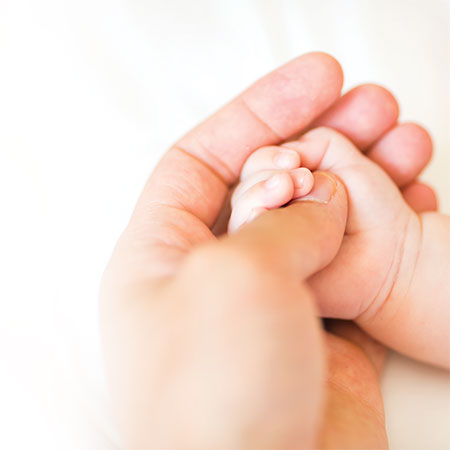Giving birth is a grand event. It’s possible to make this experience even more positive by being well-prepared.
The importance of a healthy lifestyle
During your pregnancy, it is essential to take good care of yourself and of your health. Staying physically fit will greatly help you when the time comes to give birth. By adopting a healthy lifestyle, you will also provide the foetus an optimal environment to thrive.
To do this, make sure you:
- eat well
- don’t smoke or drink alcohol
- rest and get restorative sleep
- reduce stress
- exercise while following the recommendations of the professional that is monitoring your pregnancy
Prenatal classes
Is it worthwhile signing up for prenatal classes? Many parents-to-be ask themselves this question. The answer is "yes"! In our opinion, signing up with your spouse is one of the best ways to adequately prepare for childbirth.
It covers a wide range of very relevant topics that will help you to have a more positive experience during pregnancy, childbirth and the postnatal period. Additionally, you will learn practical notions to take good care of your baby. Searching for information on the Internet can be great, but exchanging with experts and other parents-to-be can be a very enriching experience.
Find out about the services provided in your area.
Pain management
Giving birth is a joyous, but painful event. If you have a vaginal delivery, you will need to push very hard and will undoubtedly feel strong labour pains. This is completely normal. Each woman is unique and feels labour pain differently, to various degrees of intensity.
There are a number of ways to alleviate or manage labour pain. There is no single method that works for all mothers-to-be. It is important that the methods you use are comfortable and effective for you.
Some women choose to have a "natural" birth, choosing not to use any form of analgesia. Others prefer considering to take an analgesic to better control pain.
The most widespread pain relief technique is the epidural. This anesthesia, performed in the lower back, is an effective pain relief method. However, in some cases, it is not possible or wanted. It is advisable to consider and read up on the matter ahead of time in order to make the right choice when the time comes.
Massages, position changes, the Bonapace method and water immersion are examples of natural methods that can be used to ease labour pain.
Your preferences concerning pain management should be discussed with your doctor or midwife before the delivery.
Stress and anxiety management
During labour, the more the mother is relaxed, the more effective the contractions. This shortens the duration of labour. Conversely, stress and anxiety compromise the smooth flow of things and make the experience more difficult.
Various methods are helpful in managing stress and anxiety. During pregnancy, it is possible to learn certain relaxation techniques, such as:
- deep breathing exercises
- visualization
- meditation
- yoga, and
- self-hypnosis
By using one or several of these techniques, it is also possible to better control labour pain.
Speak to your doctor or midwife if the idea of giving birth stresses or frightens you.
Well-informed decisions
During the course of your pregnancy, certain important decisions will have an impact on the delivery. For example:
- Choosing if you prefer your pregnancy to be monitored by a family doctor, gynecologist or midwife.
- Consider the possibility of your baby being in a breech position. This procedure is done by a doctor and allows the baby to be turned inside the uterus, so he/she is in a better position for delivery (head down).
- Consider the possibility of a delivery by caesarean if the situation warrants it, such as:
- less-than-optimal position of the baby in the uterus
- high birth weight baby
- presence of a maternal infection that can carry risks of transmission to the baby during childbirth by vaginal delivery
- placenta previa (placenta is placed in a way that blocks the baby’s passage)
- etc.
In order to make well-informed decisions, it is important to carefully choose your information sources. You could, of course, read up on the subject and check the validity of the information, but remember that nothing beats speaking with skilled healthcare professionals that you trust!
Remember that your pharmacist is always there to help if you have any health-related questions!

